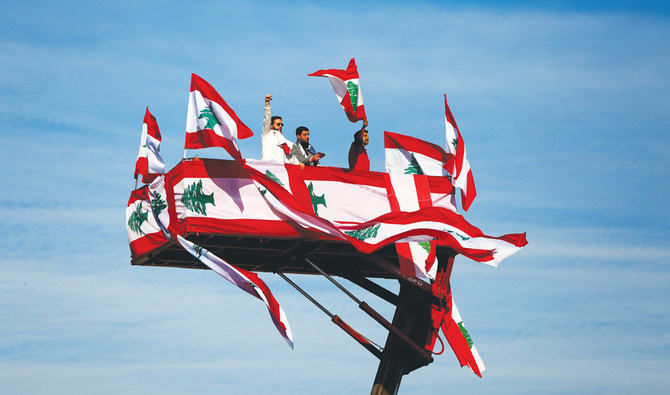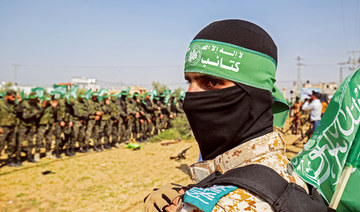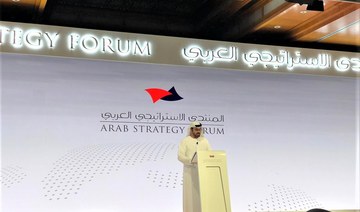DUBAI: Across the Arab world, an increasing number of citizens disagree with the “use of religion for political gain,” according to a recent YouGov survey.
As part of its partnership with the Arab Strategy Forum, Arab News commissioned a survey of the views and concerns of Arabs today and their projections for the future of the region.
A total of 3,079 Arabic speakers were surveyed, aged 18 and above and living across 18 countries in the Middle East and North Africa (MENA).
Results revealed that 43 percent strongly disagree with the “use of religion for political gain,” while 15 percent “somewhat disagree.” By contrast, 7 percent strongly agree and 8 percent “somewhat agree.”
Another 14 percent “neither agree nor disagree” with the “use of religion for political gain.”
#ArabStrategyForum: A majority of Iraqis and Lebanese believe religion is affecting their government's political decisions, and that separation of religion and politics would lead to less wars, suggests a YouGov pan-Arab poll. Watch the video for more of the survey results. pic.twitter.com/pPkHwcpB60
— Arab News (@arabnews) December 9, 2019
The combined average, however, unambiguously opposes the idea — at 58 percent. “The cases of Lebanon and Iraq shows a streak of anti-sectarianism rather than that of anti-religion per se,” said Dr. Albadr Al-Shateri, politics professor at the National Defense College in Abu Dhabi.
“Religious beliefs are deep-seated in these societies, so the advent of Western-style secularism in the region is doubtful. Even the most secular country in the Middle East, Turkey, turned out to have religious inclinations when it voted in an Islamist party” more than a decade ago.
As long as people have little trust in political institutions, they will revert to their primary social institutions, notably religion, family and tribe, Al-Shateri told Arab News.
Dr. Abdulkhaleq Abdulla, a former chairman of the Arab Council for Social Sciences, said that the YouGov findings suggest that the days of using religion for political gain are over.
“We are seeing more and more awareness that religion-based political parties are not so genuine in their religious preaching,” he told Arab News.
“People are becoming aware that those who preach freedom, equality, democracy and women’s empowerment using religious discourse are no longer believable.”
Significant numbers disagreed with the statement in Iraq and Kuwait (74 percent), as well as in Lebanon (73 percent), Libya (75 percent), Sudan (79 percent), and Syria and Yemen (71 percent).
“Ultimately, it’s a question of credibility of politicians,” said Nadim Shehadi, an associate fellow at Chatham House, adding that “the credibility of political establishments is on the decrease globally because they are failing to deliver.”
He said that there is a general sense globally that political establishments are corrupt and not credible, which he partly pins on shifts in generational issues.
“Your grandparents’ concerns were probably more nationalistic,” he told Arab News.
“The generation of your parents were more about religion and, frankly, the new generation is more concerned about gender issues than anything else.
“Nationalism is totally irrelevant to them and religion far less.”
According to Shehadi, exploitation of religion no longer stirs up the young generation as they have different concerns. “They are on a different planet from politicians,” he said.
“Politicians are addressing issues that are very different from what the new generation is concerned with.”
With unrest continuing in several Arab countries, including Iraq and Lebanon, Abdulla sees it as a second round of the so-called Arab Spring, this time gripping Algeria, Sudan, Lebanon and Iraq.
“What is clear is that this second round is much more peaceful, focused and has already delivered a great deal,” he said.
“In Sudan, we have seen a very peaceful transition that was done to the satisfaction of the Sudanese people, and transition to democracy is going smoothly.
“In Algeria, it’s settling down and an election is coming up with some opposing it. But none of these two cases have witnessed the violence that engulfed Libya and Syria.”
That said, the future will depend on how governments and societies respond to the demands of the youth, according to Al-Shateri.
“The region faces many problems. However, the underlying cause is the lack of good governance. The concept of good governance has its provenance in Arab and Islamic traditions; it is not the equivalent of Westminster-style government necessarily.
“It is based on accountability, justice, equality, rule of law, ombudsmanship and the right to petition the government.”
Al-Shateri said Lebanon, Algeria, Iran and Iraq are examples of countries that have failed to provide these conditions, adding that the same was the case in Tunisia, Egypt, Yemen and Syria when the Arab Spring uprisings began in 2011.
If regional countries achieve good governance, Al-Shateri expects many improvements in society, the economy and governance. “Short of that, the region will languish in backwardness, underdevelopment and conflict,” he said.














